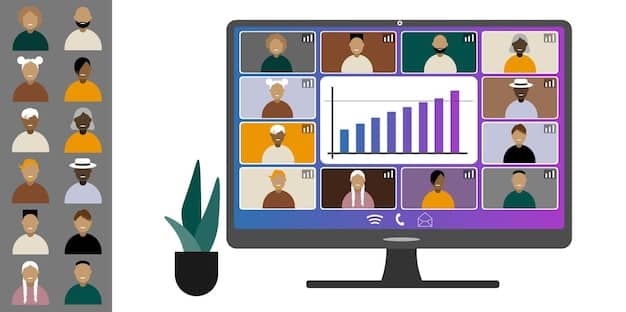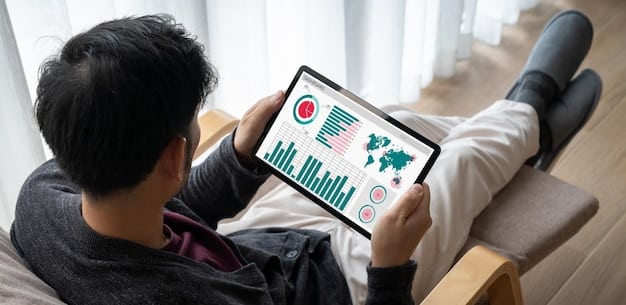US Remote Team Performance Reviews: Effective Evaluations in 2025

In 2025, conducting effective performance reviews for US remote teams requires a strategic approach focusing on clear communication, defined metrics, regular feedback, and leveraging technology to ensure fairness and accuracy in evaluating contributions and fostering employee growth.
The shift towards remote work has transformed the way organizations operate, and with it, the methods for evaluating employee performance must evolve. Mastering **US remote team performance reviews: How to conduct effective evaluations in 2025** is crucial for maintaining productivity, fostering engagement, and ensuring fairness within your distributed workforce.
Effective US Remote Team Performance Reviews: Setting the Stage for 2025
Understanding the Landscape of Remote Work in the US
Remote work in the US has seen exponential growth, necessitating adapted management strategies. This shift brings both opportunities and challenges to performance evaluations, requiring a nuanced approach to ensure fairness and accuracy.
The Evolution of Remote Work in the US
The rise of technology and changing workforce expectations are driving the remote work trend. Companies across diverse sectors are embracing remote work to tap into a wider talent pool and enhance employee satisfaction.
Unique Challenges in Evaluating Remote Teams
Distance can create barriers to understanding individual contributions and team dynamics. Overcoming these challenges requires careful planning and implementation of effective evaluation strategies.
- Communication barriers: Misinterpretations and lack of non-verbal cues can hinder clear feedback.
- Measuring productivity: Defining and tracking relevant metrics becomes essential.
- Maintaining engagement: Keeping remote employees connected and motivated is crucial for performance.
Adapting to these challenges ensures that performance reviews remain relevant, fair, and contribute to overall team success.

Key Components of Effective Remote Performance Reviews
Effective remote performance reviews hinge on several critical components that foster a transparent and equitable evaluation process. These include clear goal setting, consistent feedback, and the use of appropriate technology.
Setting Clear and Measurable Goals
Establishing well-defined goals aligned with business objectives is the foundation of effective performance reviews. These goals should be specific, measurable, achievable, relevant, and time-bound (SMART).
Providing Regular and Constructive Feedback
Consistent feedback helps remote employees stay on track and understand their progress. Regular check-ins and performance updates are essential for addressing issues promptly.
- Schedule frequent one-on-one meetings: Discuss progress, challenges, and career development.
- Use a feedback tool: Implement technology to collect and share feedback efficiently.
- Focus on behavior and impact: Provide specific examples of both positive and negative performance.
By integrating these components, performance reviews can drive continuous improvement and support employees’ professional growth.

Leveraging Technology for Accurate Performance Assessment
Technology plays a pivotal role in gathering data and facilitating the review process, ensuring a comprehensive and unbiased evaluation. Utilizing performance management systems and analytics tools can significantly enhance the accuracy and efficiency of reviews.
Utilizing Performance Management Systems
Performance management systems centralize all performance-related data, making it easier to track progress and identify areas for improvement. These systems often include features like goal setting, feedback collection, and performance tracking.
Data-Driven Insights with Analytics Tools
Analytics tools provide valuable insights into remote team performance, helping managers identify trends and patterns. These tools can measure productivity, engagement, and overall team effectiveness.
- Track key performance indicators (KPIs): Monitor metrics relevant to each role and team.
- Use project management software: Assess progress and identify bottlenecks.
- Analyze communication patterns: Understand team dynamics and identify potential issues.
By leveraging technology, organizations can ensure that performance reviews are based on objective data, fostering fairness and transparency.
Addressing Bias and Ensuring Fairness in Evaluations
Bias can significantly undermine the fairness and credibility of performance reviews. Implementing strategies to mitigate bias is crucial for fostering a culture of equity and inclusion.
Common Biases in Performance Reviews
Several biases can creep into performance reviews, including recency bias, halo effect, and affinity bias. Understanding these biases is the first step in addressing them.
Strategies to Mitigate Bias
Implementing structured evaluation processes reduces the potential for bias. Requiring managers to provide specific examples and supporting data ensures a more objective assessment.
- Train managers on unconscious bias: Educate them about different biases and their impact.
- Use standardized evaluation forms: Create consistent criteria for assessing performance.
- Implement a review process: Ensure that multiple perspectives are considered.
By actively addressing bias, organizations can promote trust and fairness in the evaluation process.
Best Practices for Delivering Constructive Feedback to Remote Employees
Delivering feedback effectively is essential for driving performance improvement and fostering employee development. This requires a thoughtful and empathetic approach, especially in a remote setting.
The Importance of Empathy and Active Listening
Empathy and active listening are critical when delivering feedback to remote employees. Understanding their perspective and challenges helps build trust and facilitates a more productive conversation.
Structuring Feedback for Maximum Impact
Providing specific examples of behavior and its impact helps remote employees understand the feedback and identify areas for improvement. Using a structured approach ensures clarity and relevance.
- Start with positive feedback: Recognize accomplishments and strengths.
- Focus on specific behaviors: Provide concrete examples of what the employee did.
- Discuss the impact: Explain how the behavior affected the team or organization.
By delivering feedback with empathy and structure, organizations can empower remote employees to grow and excel.
Preparing for 2025: Trends and Future of Remote Performance Reviews
The future of remote performance reviews is likely to be shaped by evolving technology and changing workforce expectations. Staying ahead of these trends will ensure that evaluation practices remain relevant and effective.
Emerging Technologies and Their Impact
Artificial intelligence (AI) and machine learning (ML) are poised to transform performance reviews. These technologies can provide real-time feedback, personalized learning recommendations, and automated performance tracking.
Adapting to Changing Workforce Expectations
The workforce of 2025 will prioritize flexibility, transparency, and continuous feedback. Organizations must adapt their performance review practices to meet these expectations.
- Implement continuous performance management: Provide ongoing feedback and coaching.
- Focus on employee development: Support career growth and learning opportunities.
- Promote transparency: Share performance data and evaluation criteria openly.
By embracing these technologies and adapting to changing expectations, organizations can create performance review processes that drive engagement, productivity, and employee satisfaction in the years to come.
| Key Element | Brief Description |
|---|---|
| 🎯 Clear Goals | Set SMART goals aligned with business objectives. |
| 🗣️ Regular Feedback | Provide consistent and constructive feedback. |
| 📊 Data-Driven Insights | Use analytics for objective performance assessment. |
| ⚖️ Bias Mitigation | Implement strategies to reduce bias in evaluations. |
Frequently Asked Questions
▼
Regular performance reviews, typically quarterly or semi-annually, are essential for remote teams. Consistent check-ins help maintain alignment and address issues promptly, fostering continuous improvement.
▼
Focus on metrics aligned with business objectives, such as task completion rates, project timelines, customer satisfaction scores, and employee engagement levels. Data-driven insights provide a clear picture of performance.
▼
Implement structured evaluation processes, train managers on unconscious bias, use standardized evaluation forms, and ensure multiple perspectives are considered during the review process. This promotes fairness.
▼
Leverage performance management systems, analytics tools, project management software, and communication platforms to gather data and facilitate the review process. These technologies streamline evaluations.
▼
Focus on empathy and active listening, start with positive feedback, provide specific examples of behavior, discuss the impact of their actions, and offer solutions for improvement. Thoughtful feedback fosters growth.
Conclusion
Mastering **US remote team performance reviews: How to conduct effective evaluations in 2025** is essential for maintaining productivity, fostering engagement, and ensuring fairness within your distributed workforce. By following these guidelines, organizations can create a supportive and effective remote work environment.





